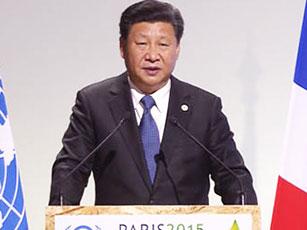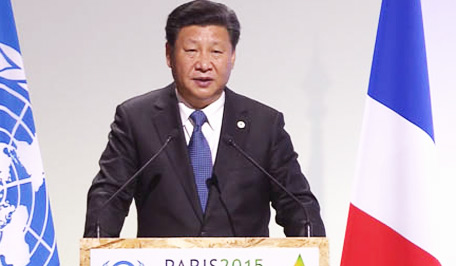President Xi addresses Paris conference

 0 Comment(s)
0 Comment(s) Print
Print E-mail CNTV, December 1, 2015
E-mail CNTV, December 1, 2015
Chinese President Xi Jinping and world leaders are gathering in Le Bourget, a suburb of Paris, to lend political impetus to a key United Nations (UN) climate change conference starting on Monday.
 |
|
President Xi addresses Paris conference |
Xi, among leaders from over 150 countries, is scheduled to deliver a speech at the opening ceremony of the two-week conference, officially called the 21st Conference of the Parties to the United Nations Framework Convention on Climate Change.
The highly-anticipated meeting aims to yield a new international agreement to reduce greenhouse gases beyond 2020, when the 1997 Kyoto Protocol expires.
Such an accord is seen as crucial for keeping the rise in global temperatures within 2 degrees Celsius above pre-industrial times, a goal scientists say should be met to avoid risky changes in the climate.
Xi's speech will focus on China's understanding of and position on addressing climate change, according to Chinese diplomats.
The expected deal should reflect the principles of "common but differentiated responsibilities" (CDR), "equity" and "respective capabilities," which were outlined in the UN Framework Convention on Climate Change, said the diplomats.
For the outcome of the Paris conference, China expects an "all-round and balanced" solution covering actions and mechanisms before as well as beyond 2020, and attaching equal importance to emission cutting, adaptation, funding and transfer of technologies, they said.
It is also the hope of China that the Paris conference send a clear signal to the world, urging countries to translate the tasks of cutting emissions and addressing climate change into inherent drive for upgrading the economy, ensuring energy security, and mitigating risks from climate change.
Last but not the least, the diplomats said, developed countries should fulfill their obligations in funding and technologies, and keep boosting such support beyond 2020.
As a developing country, China has taken bold actions to reduce carbon emissions while setting ambitious climate goals.
China has pledged to cut its carbon emissions per unit of GDP by 60-65 percent from 2005 levels by 2030, according to an action plan, called "Intended Nationally Determined Contribution (INDC)," the country submitted to the the Secretariat of the UN Framework Convention on Climate Change late June.
The world's second largest economy also vowed to increase non-fossil fuel sources in primary energy consumption to about 20 percent and peak its carbon emissions by the same date, according to the document.
These pledges represent a big step further from its previous emission control targets.
To act on climate change is not only driven by China's domestic needs for sustainable development in ensuring its economic, energy, ecological, food security as well as the safety of people's life and property, but also driven by its sense of responsibility to fully engage in global governance, to forge a community of shared destiny for humankind and to promote common development for all human beings, said the INDC.





